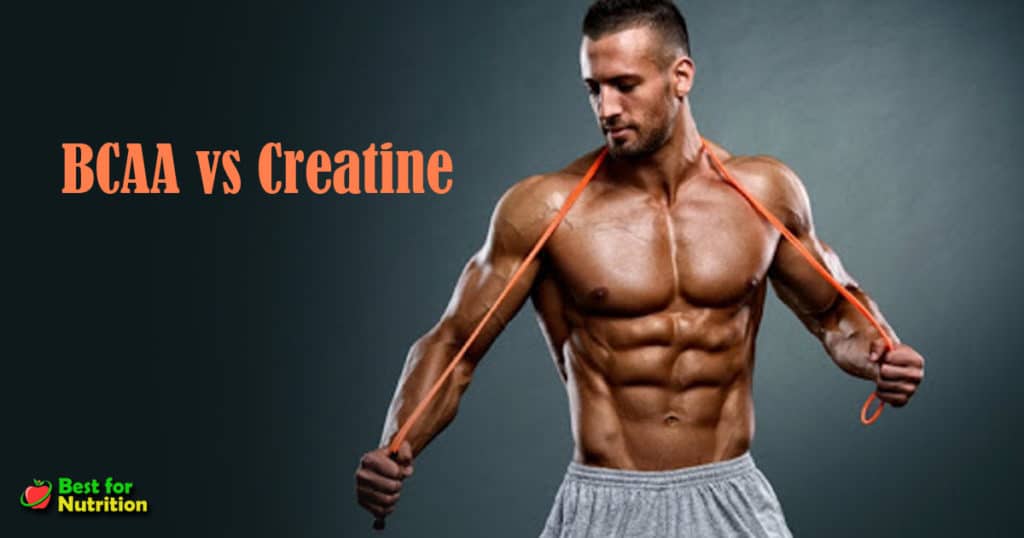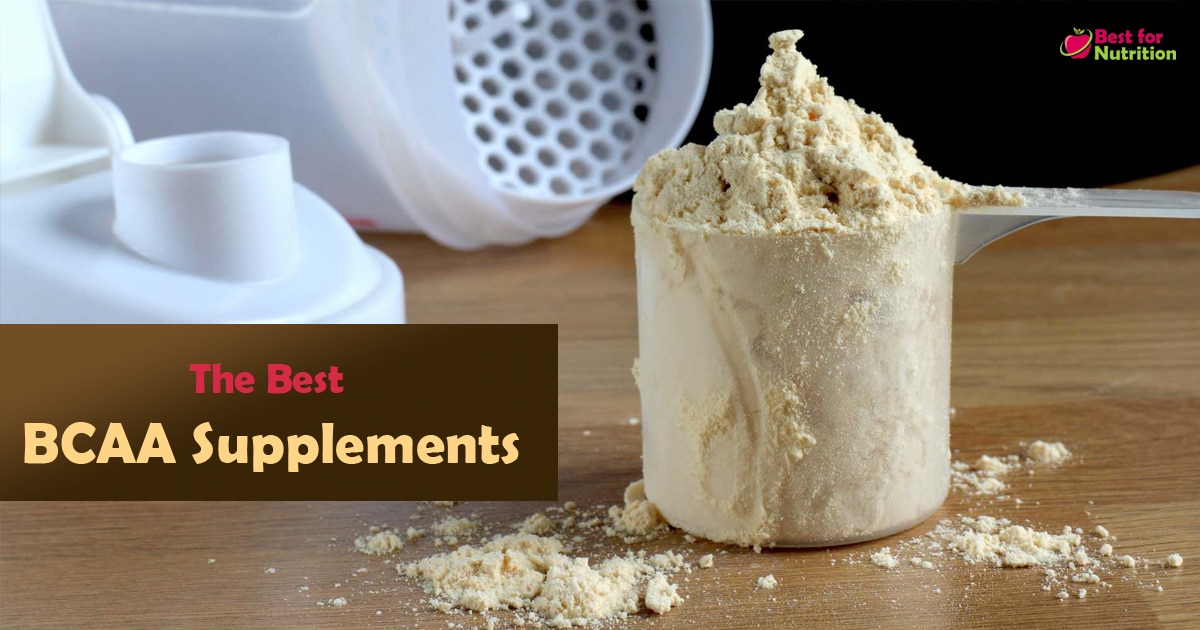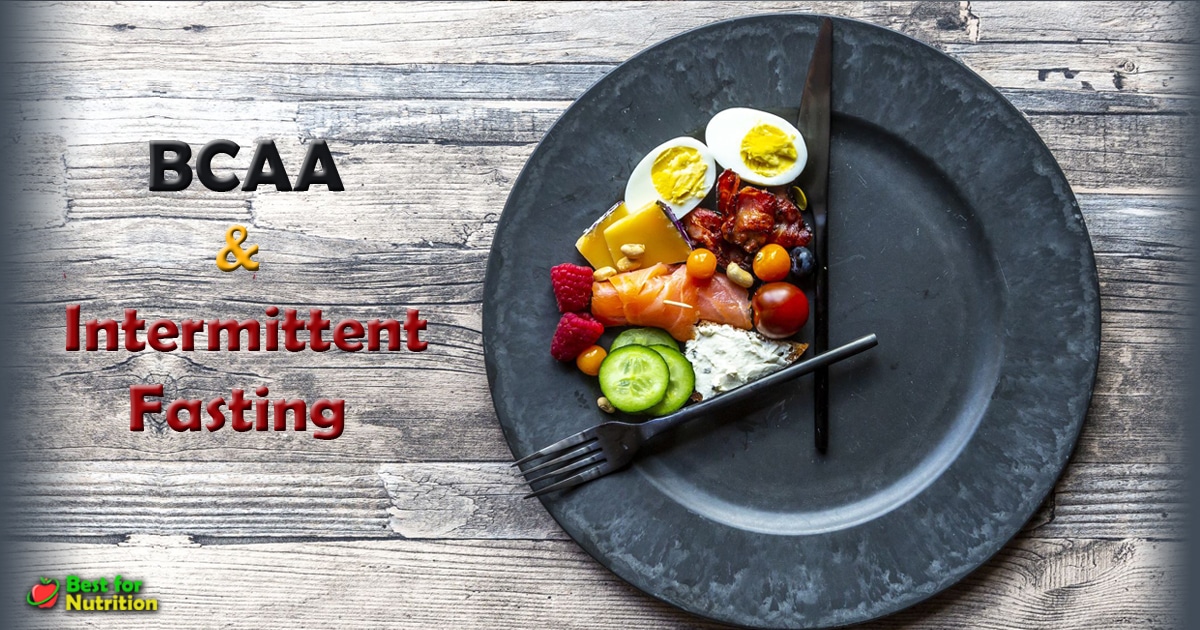Creatine and BCAA are both popular among bodybuilders for boosting muscle synthesis. But which one is better?
Is it a bright idea to take both BCAA and creatine to maximize muscle gains?
While one of them reduces fatigue during exercise and the muscle soreness afterward, the other one is known for its energy and strength boosting powers.
Even though both of them are amino acid supplements, they work in different ways to enhance your muscle-building efforts.
So read on to find out who wins this battle of the best supplements: Creatine vs BCAA!
- What Are BCAAs?
- How BCAAs Work?
- When is BCAA Supplementation Favorable?
- What Is Creatine?
- What Does Creatine Do?
- When is Creatine Supplementation Favorable?
- BCAA vs Creatine: The Winner
- Can BCAA And Creatine Supplements be Taken Together?
- FAQs Related to BCAA and Creatine

What Are BCAAs?
The three essential amino acids, leucine, isoleucine, and valine, are the branched-chain amino acids (BCAA) (1).
“Branched-chain” refers to the chemical structure of these three amino acids. The bonds in them branch off from their main structure. When ingested, these amino acids can work faster than most other amino acids as they are metabolized differently.
BCAAs get absorbed directly from the bloodstream and can bypass the digestion process in the stomach altogether. They are directly metabolized and utilized as an energy source in the skeletal muscles (2).
BCAAs are efficient in reducing protein breakdown and increase protein synthesis. They are known to protect your lean muscle mass and guard against muscle wasting (3).
Leucine stimulates muscle protein synthesis and plays a crucial role in burning fat (4). Isoleucine aids in quick recovery and prevents muscle loss. Valine boosts energy and aids in muscle repairing (5).
Hence, BCAAs have come to be known as an efficient supplement for people who want to increase their lean muscle mass.
Summary: BCAAs are a combination of the three essential amino acids, leucine, isoleucine, and valine. They protect lean muscle mass from muscle wastage by reducing protein breakdown and increasing protein synthesis.
How BCAAs Work
As BCAAs get absorbed directly from the bloodstream, they can fuel your workout through a process called gluconeogenesis, where it burns itself as fuel thereby helping preserve the muscle breakdown (6).
BCAAs can be used as a standalone supplement or in combination with others such as whey protein or creatine. BCAA is a quick energy source and all the three BCAAs efficiently aid in muscle synthesis.
BCAAs benefit bodybuilders in many ways:
- By activating the mTOR signaling pathway, BCAAs stimulate and enhance muscle protein synthesis.
- Activate enzymes such as protein kinase. This initiates phosphorylation and increases the rate of protein synthesis (7).
- Reduces muscle soreness induced by exercise (8).
- Optimizes post-workout recovery (9).
- Increases lean muscle mass (10).
- Promotes fat loss by suppressing appetite and increased metabolism (11, 12).
- Increases strength (13).
- It helps you work harder without getting exercise-induced-fatigue (14).
- Used as a fuel for instant energy production (15).
Summary: BCAAs boost muscle synthesis, reduce exercise-induced fatigue during the workout, and speed up post-workout recovery.
When is BCAA Supplementation Favorable?
BCAA supplementation is a favorable choice in the following circumstances:
- When you want to reduce body fat without compromising your lean muscle mass.
- When you are protein deficient while following a low-calorie diet. BCAAs can be taken before working out in a fasted state.
- When you are doing cardio, gymnastics, aerobics, HIIT, strength training, etc. and need to improve on your endurance levels.
- When you need sufficient amino acid for muscle protein synthesis during and after an extensive workout.
- You are a vegetarian and not getting enough of the amino acids that are more commonly found in animal protein sources.
Summary: BCAAs are a good choice if you wish to reduce body fat without sacrificing lean muscle mass. They are ideal as a pre-workout supplement if you are working out in a fasted state or performing long-duration workouts.
What Is Creatine?
Creatine is made of three non-essential amino acids: arginine, glycine, and methionine (16). Unlike the BCAAs, creatine is naturally produced in the human body and stored in the muscles in the form of creatine phosphate where it gets used as energy fuel (17).
Creatine is often used as a dietary supplement for the improvement of muscle strength and athletic performance. Research suggests that creatine is one of the most effective supplements for high-intensity exercise (18).
The amino acid arginine helps improve exercise performance and recovery. Glycine promotes muscle growth while methionine has anti-inflammatory and pain-relieving properties (19).
Studies have shown that creatine supplementation increases muscle phosphocreatine levels approximately 15-40 % and enhances anaerobic training capacity and training volume (20).
In addition to these functions, creatine can be used for relieving muscle cramps and reducing symptoms of multiple sclerosis, and depression.
Summary: Creatine is made in our body from the amino acids arginine, glycine, and methionine. Taken as a dietary supplement, it improves muscle strength and athletic performance.
What Does Creatine Do?
Unlike BCAAs, creatine is not absorbed into the bloodstream directly. It gets stored in the skeletal muscles as creatine phosphate where it replenishes ATP and serves as a potent energy source (21, 22).
The more the creatine stored in your muscle cells, the more the energy molecules that can be used for strength, power, and muscle growth. This extra energy helps increase muscle strength and reduces fatigue during your workout.
Instead of synthesizing muscles like BCAAs, creatine gives you more endurance and promotes muscle growth. It’s mechanisms include:
- Provides rapid energy for muscle contractions (23)
- Causes the release of anaerobic hormone IGF-1 that is used in promoting muscle growth (24)
- Is a quick source of muscle energy that offers more total work in a single training session (25)
- Aids long term bone strength for weight trainers (26)
- Increases strength during resistance training by up to 20% (27)
- Increases water content in the muscle cells thereby causing cell volumization that is crucial in the growth of big muscles (28)
- Enhances muscle size (29)
Summary: Creatine increases your strength for resistance exercises and enhances muscle size. It is stored as creatine phosphate in muscle cells and offers rapid energy for heavy lifting and high-intensity workout.
When is Creatine Supplementation Favorable?
Since BCAA and creatine have some similar properties, they are both helpful in certain circumstances. But they also have unique properties that offer them other advantages. Creatine supplementation is favorable when:
- When you are doing heavier and longer workout sessions to increase muscle mass and you need more energy.
- When you want big, bulky muscles as creatine draws in more water into the muscles making them look larger and gain more strength.
- When you need a spurt of extra energy while performing HIIT workouts.
Summary: There are many circumstances where creatine is preferred over BCAA. Creatine offers an energy boost during HIIT exercises and long-duration workouts. If you are looking to build muscle size, creatine is a good choice.
BCAA vs Creatine: The Winner
Now that you know how the two supplements work, the biggest difference between BCAAs and creatine is how each of them affects athletic performance.
Both BCAA and creatine supplements have many benefits. For those who have a low protein intake, BCAAs offer an affordable, low calorie, and easy way to boost their muscle protein synthesis.
Creatine, on the other hand, provides rapid energy that helps with strength building and can be the perfect choice for powerlifters.
BCAAs help to build lean muscle mass, while creatine helps increase your power output during high-intensity training resulting in an increase of strength and training volume (30).
Unfortunately, there is no clear answer to the question – Which one is better, creatine or BCAAs? The answer depends upon your fitness goals, dietary intake, exercise regimen, duration of the workout, and other related factors.
A nutritionist can help you understand your nutritional needs and guide you in choosing the right foods and supplements that help build the body you desire.
Summary: The choice of creatine or BCAAs depends upon many factors such as your fitness goals, dietary intake, and so on. Creatine is ideal for powerlifters and offers rapid energy boosts for strength building. BCAA reduces fatigue during workouts and speeds up muscle recovery post-workout.
Can BCAA And Creatine Supplements be Taken Together?
Yes, BCAAs and creatine can be taken together. But, they work differently. Consuming them together gives you both protein sources for new muscle synthesis and energy for your workout. This potent combination offers you extra power and endurance.
Creatine is a better choice for sprinters, boxers, and powerlifters, who need that instant spurt of energy. Creatine supplementation before intense training helps provide the rapid energy that your body needs during muscle contraction and strength building.
BCAA is more ideal for bodybuilders, rowers, and crossfitters who need increased endurance, energy, and help with recovery after the activity. The leucine in BCAAs aid in muscle repair.
Summary: BCAAs and creatine together form a potent combination that offers you both power and endurance.
FAQs
Are BCAA Supplements Safe?
For most people, BCAA supplements are generally safe to have. Even though studies on the safe upper limit are quite rare, some that are available report that total BCAA intake between 15-35 grams per day is normally fine (31).
However, BCAA supplements are not suitable for those suffering from ALS or Lou Gehrig’s disease. In addition, people who have a rare congenital disorder called maple syrup urine disease should definitely limit their intake.
Their bodies are incapable of breaking the BCAAs properly.
Will Creatine Make you Look Bigger?
How to Supplement with Creatine?
Creatine supplementation is done fastest during the loading phase. This involves taking a high dose of creatine for a few days and then a lower dose after that (34).
You can take about 20-25 grams of creatine per day, in 5-gram doses, for 5 to 7 days. This is then followed by a maintenance dose of 3 to 5 grams of creatine per day.
When Should You Take BCAA?
It entirely depends upon your fitness regime.
Taking BCAA as a pre-workout supplement helps increase your performance and muscle growth (35).
BCAA supplementation in the middle of the workout/activity also has tremendous benefits during and after the performance. It is generally seen in long-distance runners. BCAA helps them to improve their speed and endurance (36).
BCAA supplementation post-workout boosts muscle recovery and reduces post-workout muscle soreness (37). It supplies you with the amino acids that help in the synthesis of new muscles.
What Happens When You Stop Creatine?
It is possible to stop creatine as you don’t need to take it forever. But your muscle’s creatine level will start to dip about two weeks after you stop taking it.
By 4-6 weeks, the extra creatine will wash out of your muscles altogether and your body will be back at producing its baseline level. If you still are active as an athlete, or powerlifter or into strenuous exercise, your performance will fall drastically owing to your low energy.
Sufficient creatine rich food can alter the problem though. Creatine is found in red meat, poultry and fish.
The Final Note
BCAA and Creatine are both popular bodybuilding supplements, with their own set of benefits.
Creatine is more of an energy source that replenishes ATP molecules in your muscles. Higher the creatine in the muscles, the more energy your muscle cells can produce while performing high-intensity exercises.
BCAAs, on the other hand, provide the necessary nutrients for muscle protein synthesis, lower fatigue, reduce DOMS, and exercise-induced fatigue. BCAAs can help your muscles recover quickly after an intense workout.
Whether BCAA or Creatine, make sure you take the recommended dosages only. More is not always better.
BCAAs and creatine can be taken separately as needed or they can be taken together for maximizing your bodybuilding efforts.





